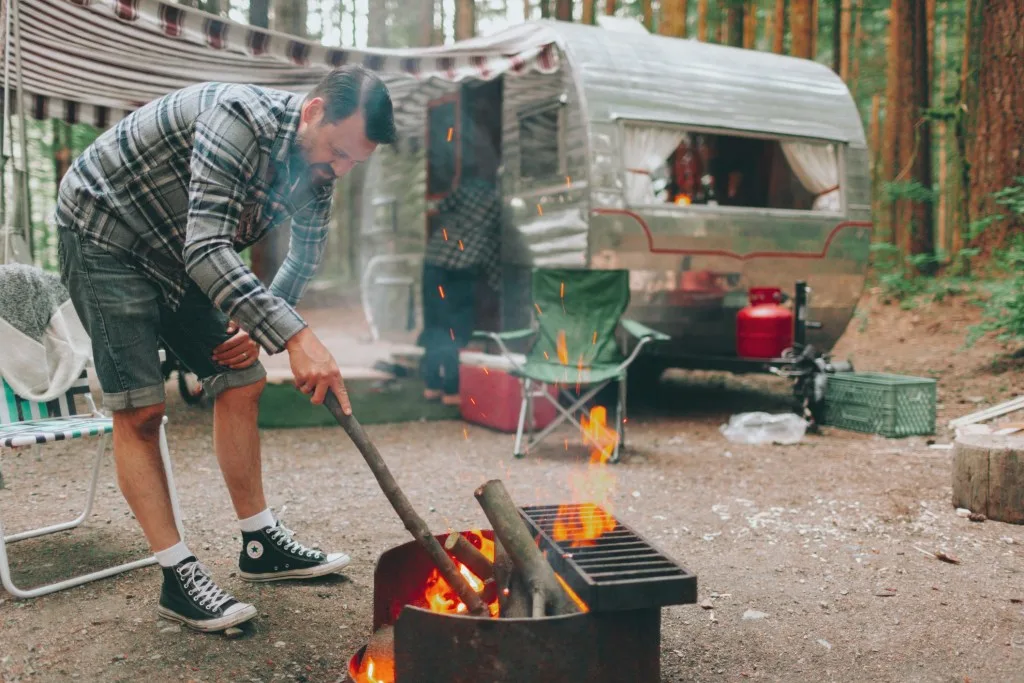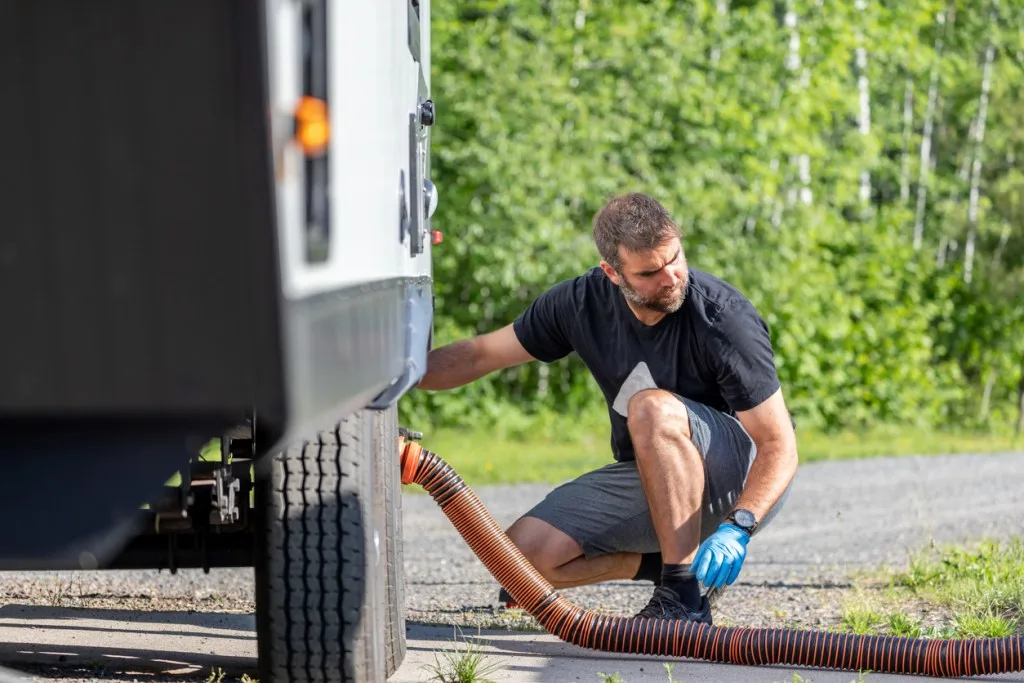RV Rookie Mistakes That Can Ruin Your Camping Trip
As an RV rookie, you’ve got a steep learning curve, and mistakes are bound to happen. The RV community is very supportive, and many will offer help when you need it.
However, some blunders can be devastating. So today, we’ll walk you through some of the worst mistakes that could potentially ruin your dream trip.
Let’s dive in!
Rookie Mistake #1 – Not Getting to Know Your RV
You’re excited! You just bought your first RV, and you’re chomping at the bit to take off on a great adventure. First, though, you really need to spend some time learning how your RV’s systems work.
Sure, you probably had the 20-minute run-through when you picked it up at the dealership. But do you remember what you’re supposed to do first when you arrive at your campsite or what that red light means?
Do you have hoses to connect to the hookups or dump station?
And what about driving your new RV? Do you know how much tail swing it has or even what tail swing is? Have you practiced backing up and turning?
One of the biggest rookie mistakes is not knowing how high your RV is – including all the stuff you had them install on the roof.
Keep in mind: RV Trip Wizard will route you on a safe path specific to your RV specs.

Take your time and get to know your RV. Go through the manual to understand how the systems work and what you need to do to maintain them. If you have a warranty or emergency towing assistance, read that too, so you know what’s covered and what’s not.
You might even try a dry run in your driveway by pretending you’re arriving and leaving your campsite. Cook a meal in it, take a shower. Do all the things you’d do at the campsite, but with the ability to walk back into the house and call for help if you need it.
Pro Tip: Here’s a deep look into the differences between drivable and towable RVs.
Rookie Mistake #2 – Not Planning Your RV Trip
First of all, definitely plan your trip. Just jumping into your RV and driving can leave you with no place to stay, or worse, shave the air conditioner off of your roof. These sound extreme, but they happen – often.
Where to Go
Yes, you can travel like a gypsy, free in the wind. But, if you work remotely, are meeting people, or have other reasons why you want to be at a certain place at a certain time, you’ll want to plan where you’ll be staying.
Don’t make the rookie mistake of arriving at your chosen campground only to find out there’s no room for you.
Many RV parks and campgrounds these days are fully booked well in advance of their peak seasons. Some take reservations one or two years ahead of time. Others only allow reservations within a few months of your visit.
And more primitive or remote locations, even certain national park campgrounds, may have first-come, first-served sites.
Make reservations for places that accept them, and remember to include any stops along the way. You can opt to stay overnight at places like Walmart or Harvest Hosts. However, make sure you have at least one backup if you’re not making reservations.
Otherwise, you might find yourself driving longer than you should.
Remember, it’s much easier to cancel a reservation than trying to find a place to stay when it’s getting dark and the kids are starving.
When to Go
Think about where you want to go. What’s the best time of year to visit? If you’re able to spend time in a location in the shoulder or off-peak season, you’ll have fewer people there with you.
In most places, peak season is summertime, so you may find that arriving during the shoulder season provides cooler weather as well.
Speaking of weather, will you be traveling where wildfires or hurricanes are prevalent?
Look up the ‘seasons’ for that area and try to plan your trip outside of those times. For example, southern Alabama’s hurricane season is typically June 1 through November 30.
However, September sees the majority of hurricanes, so you’ll be relatively safer the farther away from September you travel there.

Routing Mistakes in an RV
Part of preparing for your trip includes route planning.
You can usually get from point A to point B in your car just by punching your destination into your maps app and stepping on the gas. However, you need to be more cautious with an RV, especially the longer and taller ones.
RV Trip Wizard and other RV route planners are excellent for this. You can enter your starting and ending points, plus all your in-between stops. Most will also let you set up your RV’s height and show you roads to avoid low overpasses or other hazards.
Some route planners will even map your elevation changes, so you’ll know if you have any steep uphill or downhill sections.
This is especially important during hot days when steep inclines might cause your rig to overheat or when freezing temperatures could create icy conditions.
Be careful of the ‘got to get it all in’ attitude too. If you try to pack it all in on one trip, you may feel more stress and pressure than enjoyment. Include down days in your plan, so you can just rest and enjoy your surroundings or take a short hike.
Too much go, go, go can lead to rookie mistakes due to distraction or exhaustion.
Must know advice: The RV 2/2/2 Rule will keep you safe and happy when traveling.

Rookie Mistake #3 – Problems at the RV Park or Campground
Arrival
Once you arrive at your campground, whether it’s a boondocking spot in the wilderness or an urban RV resort, there are a few things you’ll want to check. In fact, one of the biggest rookie mistakes is forgetting to look up before pulling into your site.
Look at your site.
Are there any tree limbs that might scratch your RV or cause even more damage? Check for bushes that are too close for your slides or soft spots or holes on the ground. Is it so muddy you might have a difficult time getting back out?
If you’re backing in, you’ll especially want to gauge the location of any objects on the site, such as a picnic table or firepit. Do you need to move them or ensure you pull in farther to the side?
If you’ve got help backing into your spot, talk it over with that person, so you’re both on the same page as to how to proceed.
Think about doing all of the above in the dark.
It doesn’t sound fun or practical. Does it?
Go back to your route planning and be sure you’re allowing plenty of time to arrive at each destination before dark. You want enough time to check-in, park, and set up before dusk. Besides, what better way to celebrate arrival than kicking back in your camp chair to watch the sunset?

Follow the Rules
Every RV park and campground has rules that you must follow or risk being kicked out. These typically follow common sense and ‘good neighbor’ practices, but they’ve obviously had to put them in writing for a reason.
Rules such as picking up your dog’s poo or blasting your music at midnight should be easy to follow. And, making the mistake of assuming the rules aren’t enforced could lead to the manager or even the police asking you to leave.
One of the easiest RV rookie mistakes to make that involves breaking the rules is not leaving your site before check-out time. When you’re a beginning RVer, getting everything packed up and ready to drive can take a lot longer than you think.
Some campgrounds understand and allow extra time between check-out and check-in. However, others run a tight ship and may go so far as to fine you a full night’s fee if you leave even 10 minutes late.
Start packing up the night before, so you have less to do in the morning, and give yourself a little extra time for those ‘just in case’ moments.
Pro Tip: You might think dispersed camping is free from rules, but public lands have their own laws. Find out more about the things you just don’t do while boondocking.
Heading Home (or to the Next Spot)
RV rookies far and wide make the mistake of leaving something behind when they take off for home or their next location. A kid’s toy might not be the end of the world to you, but it could be to them. On the other hand, forgetting to disconnect your sewer hose or electric cord could be a complete disaster to you and your RV.
We suggest you do a walk-around and a walk-through of your RV before you take off.
Ensure everything outside is disconnected and put away, that all your storage bays are locked, and there’s nothing on the ground – including litter. Then walk through the interior, ensuring all your doors and cabinets are latched, windows and vents are closed and locked, etc.
Are you taking your RV in for repairs or putting it back into storage? Check to be sure your fridge is empty and in the proper position to avoid bad smells when you return.
Dump Station Readiness
If you need to use a dump station on your way out or on the road, be ready for it. The lines at dump stations can be very long, and no one wants to wait while you find your gloves, sanitizer or soap, hoses, and other items you’ll need.
Pro Tip: Is it legal to dump RV grey water on the ground?

Rookie Mistake #4 – Not Having Multiple RV Checklists
You need to know a lot as an RVer, and it can be overwhelming as a rookie. Checklists can help you avoid the anxiety of wondering if you’ve forgotten something and the potential harm if you do.
You can use paper or any of the numerous list-making apps available these days.
We suggest creating a master list that you can then copy each time you move your RV. You can include tasks for preparing to go that encompass everything from the food you need in your cooler to pulling out the chocks.
Another checklist might be for what to do when you arrive at your campsite.
Then, of course, you’ll want one for packing up and leaving, then storing your RV until next time. Having checklists for your RV trips can help you avoid the simplest and worst rookie mistakes.
Conclusion
Rookie mistakes with your RV are bound to happen. Hopefully, you’re more aware of what can happen now, though, and can avoid the worst of them. What rookie RV mistakes have you made? How did you prevent them from happening again?
Discover the Best Free Camping Across the USA
To be honest with you, we hate paying for camping. There are so many free campsites in America (with complete privacy).
You should give it a try!
As a matter of fact, these free campsites are yours. Every time you pay federal taxes, you’re contributing to these lands.
Become a FREE CAMPING INSIDER and join the 100,000 campers who love to score the best site!
We’ll send you the 50 Best Free Campsites in the USA (one per state). Access the list by submitting your email below: